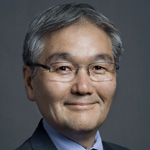The Arthritis Foundation has awarded its Lee C. Howley Sr. Prize for Arthritis Research to Wayne M. Yokoyama, MD, the Sam J. and Audrey Loew Levin Chair for Research in Arthritis and director of the Medical Scientist Training Program at Washington University School of Medicine in St. Louis.
The award is one of the highest in arthritis research.
“This prize recognizes the fundamental studies Dr. Yokoyama has done on natural killer cells, a kind of immune cell involved in protection against all sorts of microbes, viruses and tumors,” says Emil R. Unanue, MD, the Paul and Ellen Lacy Professor of Pathology and Immunology. “These cells are also thought to be relevant to autoimmune processes such as some forms of arthritis. Dr. Yokoyama has produced very important insights into how the cells work.”
“I’m delighted that my colleagues in arthritis research have selected me for recognition with such a prestigious award, but it should really go to members of my lab who actually did the work over the years,” Yokoyama says.

Yokoyama
His studies have helped show how various mechanisms enable, unleash and restrain natural killer cells. His lab was the first to provide the molecular basis for a theory known as the “missing self” hypothesis.
Prior to the development of this hypothesis, scientists had conceptualized the immune system’s method for recognizing invaders as comparable to that of police using an all-points bulletin: an alert went out that a particular invader had been seen, and immune system cells searched for and attacked that invader when they found it.
Natural killer (NK) cells opened up a new possibility more comparable to that of a border guard. Scientists suspected natural killer cells were checking the molecular “credentials” of everything they encountered and could attack if the proper identification wasn’t forthcoming (i.e., if they sensed “self” was missing). In the early 1990’s, Yokoyama and his lab identified a region of the genome that encoded NK cell receptors, which they called the NK gene complex. This led to studies where they were the first to identify a receptor on the surface of natural killer cells that enabled this identification-checking process.
The receptor inhibits natural killer cell function when it recognizes the appropriate credentials, which in this case are major histocompatibility complex (MHC) class I molecules. Normally present on the surface of cells, these molecules are often absent on tumors and virus-infected cells, allowing the NK cell to attack the abnormal cells. Later studies have shown that these receptors also educate or “license” NK cells so that they work normally.
“Dr. Yokoyama really has been the pioneer in leading us to understand the NK cells and how they work, making one nice contribution after another,” says John P. Atkinson, MD, the Samuel Grant Professor of Medicine and professor of molecular microbiology. “The role they play in arthritis is still to be figured out, but the promise is great.”
Yokoyama was recruited to Washington University in 1995 to become chief of the Rheumatology Division, a position he held until 2007 when he stepped down to become the director of the Medical Scientist Training Program, the largest such program in the country. He has been an Investigator of the Howard Hughes Medical Institute at Washington University since 1997.
The Howley Prize is named for Lee C. Howley Sr., former chairman of Revco Drug Stores Inc. The Howley family supports arthritis research.
Washington University School of Medicine’s 2,100 employed and volunteer faculty physicians also are the medical staff of Barnes-Jewish and St. Louis Children’s hospitals. The School of Medicine is one of the leading medical research, teaching and patient care institutions in the nation, currently ranked fourth in the nation by U.S. News & World Report. Through its affiliations with Barnes-Jewish and St. Louis Children’s hospitals, the School of Medicine is linked to BJC HealthCare.